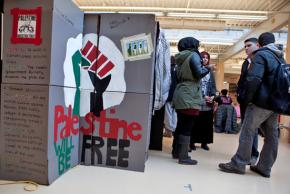SFSU protests apartheid
reports on Israeli Apartheid Week at San Francisco State University.
SOME 50 students and faculty members at San Francisco State University (SFSU) expressed solidarity with oppressed and displaced Palestinians during Israeli Apartheid Week in early March.
The event was sponsored by the General Union of Palestinian Students (GUPS); MeCha; La Raza; the Richard Oakes Multicultural Center; the Arab and Muslim Ethnicities and Diasporas Initiative; and Improving Dreams, Equity, Access and Success (IDEAS), a DREAMer-affiliated student organization. A number of other groups, including the International Socialist Organization, were there to offer support.
This year marks the eighth year that Israeli Apartheid Week (IAW) events have been observed both nationally and internationally, and the second year IAW actions have taken place at SFSU. IAW is part of a series of efforts to call attention to the grotesque human rights violations connected to Israel's construction of what Israeli officials euphemistically refer to as a "separation barrier" along and within the West Bank. In reality, it is an apartheid wall that will allow Israel to annex some 46 percent of land in the West Bank.

As Zachariah Barghouti, an organizer with GUPS, made abundantly clear, the suffering Israel's apartheid wall causes is emblematic of deeper suffering. "The everyday lives of Palestinians are already so difficult," Barghouti said, "every part of their daily existence is a struggle."
A separation barrier on campus is frequently used during IAW events to provide a tangible example of the oppression face by Palestinians on a daily basis. In recent years, more than 17,000 Palestinian homes have been demolished, resulting in hundreds of thousands of homeless.
Palestinian workers employed in settlement and industrial zones earn what is not even a subsistence wage, and any and all of the scant resources that Tel Aviv allows Palestinians to have are subject at all times to military confiscation. This is to say nothing of the persistent Israeli use of military terror and flagrant disregard for Palestinian life embodied most recently by Israel's attacks on Gaza last year.
The list of atrocities Israel continues to perpetrate upon the Palestinian people is virtually endless. Barghouti emphasized that educating people about such abuses, and encouraging them to get involved in the fight against Zionist oppression, were the larger overarching goals of the IAW events.
"Israel receives almost half of all foreign aid the U.S. doles out, and most of that comes from money that taxpayers pay. You may want to be neutral, but you're already involved because the U.S. government has made you involved," said Barghouti. "It's up to you as a human being to say that you're not going to let them get away with that."
Not all present were there in solidarity, nor were they interested in engaging in constructive dialogue, however. A pro-Israel campus organization actively attempted to derail the event, attempting to draw students and faculty away from the action and disrupt conversations.
But those standing on the right side were not deterred. A wide variety of music with lyrics calling for an end to Israeli terror played as Palestinian flags waved in the breeze. Large drab gray slabs of wood meant to reproduce apart of the separation barrier stood nearby, onto which students could write messages of support and solidarity with the Palestinian people. Leaflets and other literature with facts outlining the consequences of Israel's oppression were distributed and became the cause of much political conversation.
ONE OF the most inspiring aspects of this year's Israeli Apartheid Week at SFSU is the wide array of organizations that elected to stand with GUPS members as they demanded justice for the Palestinian people.
Bo Seo, a student representing IDEAS, saw an indelible connection between the difficulties undocumented immigrants face here and the struggles of the Palestinian people.
"We're here because we think that this issue is a human rights issue, an issue of fairness and equality, said Seo, who went on to say that some of his family, who are undocumented, have been living in this country for nearly a decade and working the entire time, paying into programs they can't use because "we live in a society where it's okay to call people 'illegal.'"
Sandy Tezen, also of IDEAS, said that as a native of Guatemala, she has witnessed firsthand the evils of imperialism, and sees the fight-back against Israel's occupation a part of the fight against it.
Edwin Espinoza, representing MeCha, even more directly linked the struggles of Palestinians abroad to struggles here in the U.S. "We are an organization that represents oppressed people, and as oppressed people, we stand against the oppression of any other oppressed people," he said.
Alma Villegas, also of MeCha, added, "We represent Chicanos and Chicanas standing with Palestine against borders." She added, "We see a connection between the border here in the U.S. and the border in Palestine, and the hardship it causes."
Marco Fuentes, an organizer with La Raza, commented, "Both borders do so much damage. They tear families apart; they ruin lives. I'm here because I want people to realize that they have to stop letting unfair, racist laws define themselves and how they see the world. It's about people uniting, and about people coming together."
People are coming together, at San Francisco State University, and everywhere to stand in solidarity with the people of Palestine.


